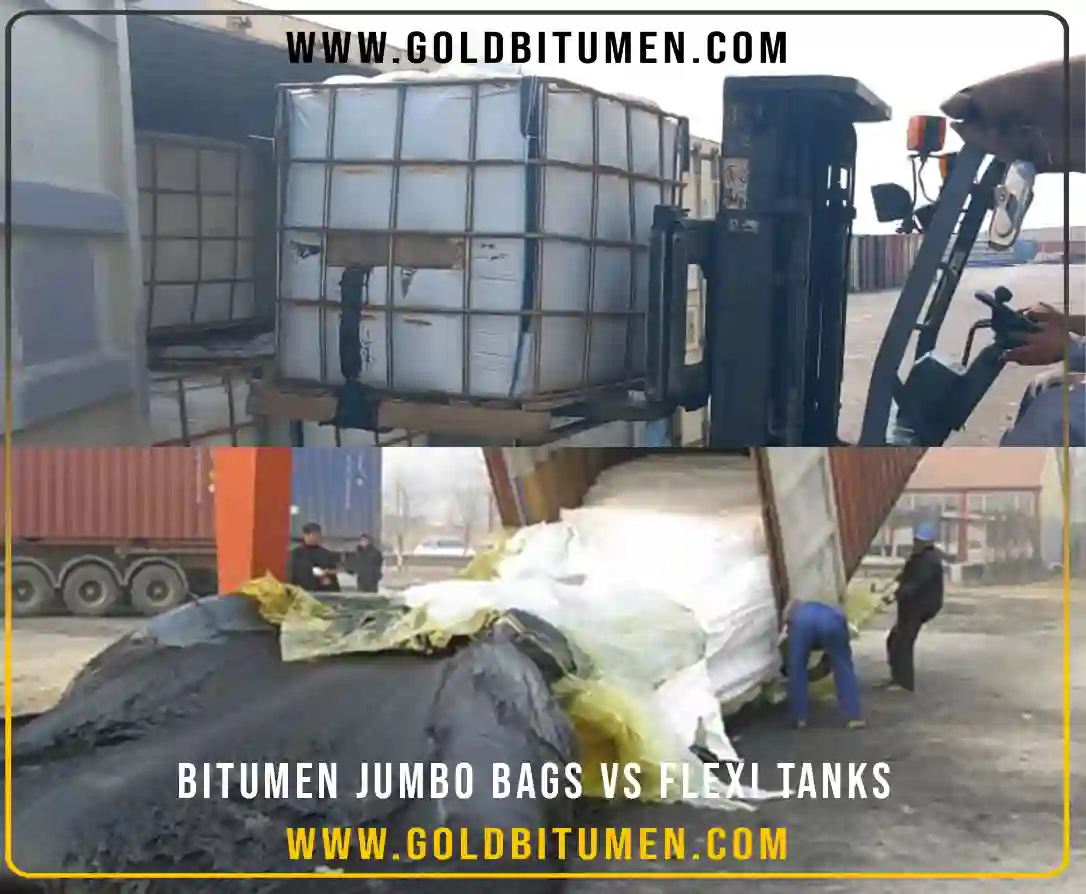
Choosing the right packaging for bitumen transport can significantly affect your project’s cost, efficiency, and final product quality. The two most common packaging solutions in the market — Jumbo Bags and Flexi Tanks — each bring unique benefits depending on your logistical setup and climate conditions.
At GoldBitumen, a trusted manufacturer and exporter of bitumen from Iran, we’ve worked with both packaging options across global markets. This guide explores which method offers better cost-effectiveness, temperature control, and long-term performance, helping you make the right decision for your business.
Understanding Bitumen Jumbo Bags
Jumbo Bags, also called BituBags or Bulk Bags, are large woven polypropylene sacks designed for solid bitumen, usually in 1-ton units. They’re widely used for international shipments because of their flexibility, safety, and low environmental impact.
Key Advantages:
Suitable for solid bitumen
Leak-proof and stackable design
Easy to handle with forklifts
Reusable and recyclable materials
Lower risk of spillage or contamination
These bags are ideal for smaller projects or customers who require precise quantities of bitumen.
Understanding Bitumen Flexi Tanks
Flexi Tanks are large, multilayered containers installed inside standard 20-foot shipping containers to transport liquid bitumen. They’re excellent for bulk shipments, reducing packaging waste and improving efficiency for high-volume buyers.
Key Advantages:
Holds up to 24 metric tons of bitumen
Perfect for liquid or hot bitumen
Enables bulk shipment at lower cost per ton
Faster loading and unloading processes
However, handling Flexi Tanks requires specific heating systems and careful monitoring during transport.
Comparing Cost-Effectiveness
Packaging and Shipping Costs:
For small to medium shipments, Jumbo Bags are more cost-efficient because they require minimal setup and handling equipment. Shipping might cost slightly more due to lower container utilization, but there’s no need for expensive heating equipment.
For large-scale deliveries, Flexi Tanks offer better economies of scale since they can transport up to 24 tons per container. However, the tanks are single-use and involve higher setup and heating costs.
Verdict:
Jumbo Bags: Cost-effective for small, flexible shipments
Flexi Tanks: More economical for bulk, continuous supply
Handling and Storage Comparison
Handling efficiency plays a key role in overall cost.
Jumbo Bags:
They can be lifted, stacked, and stored easily in standard warehouses. There’s no risk of leakage, and storage doesn’t require temperature control.
Flexi Tanks:
They demand specialized unloading systems and must be handled at high temperatures. The container cannot be reused for bitumen once emptied.
Verdict: Jumbo Bags win in storage flexibility and simplicity.
Temperature Management and Stability
Bitumen’s performance depends heavily on temperature consistency during transport.
Flexi Tanks:
Bitumen is loaded at around 160–180°C and retains heat well for several days. Still, longer shipments may require reheating at the destination.
Jumbo Bags:
Since bitumen is cooled and solidified before packaging, there’s no temperature maintenance issue. It can be stored safely for months and reheated only when needed.
Verdict:
For short-distance shipping, Flexi Tanks are efficient. But for long-haul routes, Jumbo Bags provide better safety and reliability without the risk of temperature drops.
Bitumen Quality Preservation
Quality preservation is crucial, especially for international buyers.
Jumbo Bags: Protect bitumen from oxidation and contamination since it’s stored as a solid.
Flexi Tanks: Maintain bitumen quality well but can experience minor oxidation if exposed to air during handling.
Verdict: Jumbo Bags ensure longer-lasting bitumen quality for distant deliveries.
Environmental and Safety Benefits
Sustainability and safety are now top priorities in global trade.
Environmental Impact:
Jumbo Bags are recyclable and reusable, reducing waste. Flexi Tanks, however, are typically single-use and less eco-friendly.
Safety:
Handling solid bitumen in Jumbo Bags minimizes the risk of burns or spills. Flexi Tanks, which carry hot bitumen, require strict safety protocols during unloading.
Verdict: Jumbo Bags are safer and more environmentally responsible.
Choosing the Right Packaging for Your Operation
Here’s a simplified comparison to help you decide:
| Criteria | Jumbo Bags | Flexi Tanks |
|---|---|---|
| Bitumen Type | Solid | Liquid |
| Shipment Size | Small to Medium | Large-scale Bulk |
| Cost Efficiency | High for small orders | High for bulk loads |
| Temperature Needs | None | Requires heating |
| Reusability | Reusable | Single-use |
| Safety | Very Safe | Moderate |
| Environmental Impact | Low | Higher |
If your business needs flexibility and long-term storage, go with Jumbo Bags. If you have large-scale, temperature-controlled facilities, Flexi Tanks may offer better logistics efficiency.
Why Many Importers Choose Jumbo Bags
Many importers in Africa, Southeast Asia, and South America favor Jumbo Bags due to their easy handling, long shelf life, and temperature independence.
They also allow importers to melt and use the exact quantity needed, reducing waste and maintaining high-quality standards for bitumen applications in roads and waterproofing.
Conclusion
Both Jumbo Bags and Flexi Tanks play vital roles in global bitumen transportation. However, the best choice depends on your shipment volume, storage infrastructure, and temperature requirements.
Choose Jumbo Bags for flexibility, safety, and environmental benefits.
Choose Flexi Tanks for large, cost-efficient bulk deliveries.
At GoldBitumen, a leading manufacturer and exporter of Iranian bitumen, we provide both Jumbo Bag and Flexi Tank packaging options customized to your project needs. Whether you prioritize cost savings, temperature stability, or safety, GoldBitumen ensures top-quality bitumen delivered anywhere in the world.
